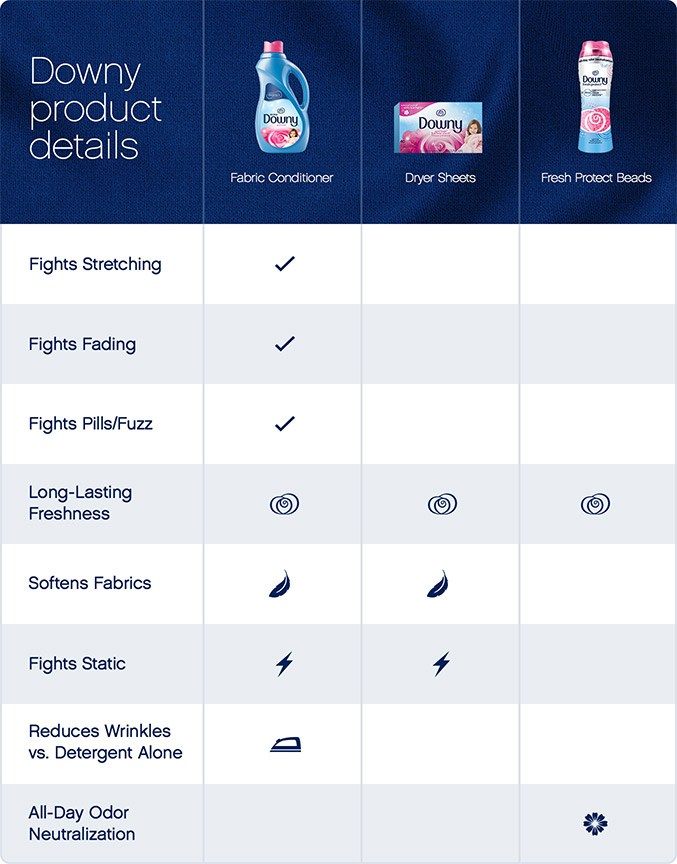Fabric softeners. They keep your clothes feeling soft and static free. And, many enjoy breathing in their fresh scent.
But, what exactly is the difference between the two types of softeners, and is one a better alternative than the other?
Both fabric softeners and dryer sheets help eliminate static and wrinkles while making clothes feel softer and smell better. However, they work in different ways. Liquid fabric softener is added to the wash cycle and permeates into fabric fibers. In addition to other benefits, liquid fabric softeners may also keep clothes from stretching, fading. Liquid fabric softener has the same function as dryer sheets, but you treat the clothes while they are still in the wash instead of in the dryer. This can be great if you have a lot of hang-dry items as you still get the benefits without the dryer heat. Downy ® Downy Fabric Softener Sheets go in the dryer to add even more softness, freshness, and static protection to your laundry. And when it comes to making your clothes comfortable, more is definitely. Fabric softener and dryer sheets soften clothes and reduce static cling in the washing.
How does fabric softener work?
Both fabric softeners and dryer sheets help eliminate static and wrinkles while making clothes feel softer and smell better. However, they work in different ways.
Liquid fabric softener is added to the wash cycle and permeates into fabric fibers. In addition to other benefits, liquid fabric softeners may also keep clothes from stretching, fading and accumulating fuzz.
However, liquid fabric softeners may stain clothes because they are made from oil. They also can build up in a washing machine’s dispenser, requiring frequent cleaning. If you are not using a dispenser or a softener ball, make sure to add liquid softener during the final rinse when the tub is full of water to avoid staining.
Dryer sheets reduce static and increase the cottony feel of fabrics. Dryer sheets are coated with stearic acid, which melts in the dryer and coats clothes to provide these benefits. In some cases, staining also has been reported, so do not overfill your dryer, and place the dryer sheet on top of the clothes after loading the dryer.
When not to use softeners
Fabric Softener Or Dryer Sheets
Because softeners essentially coat fabrics, there are a few laundry items that should not be exposed to softeners:
- Microfiber clothes: Using softeners may damage the fabric’s ability to trap dust and absorb spills.
- Athletic sportswear: Softeners’ coating may lessen this fabric’s “wicking” ability, lessening the chance you’ll feel cooler during your workout.
- Children’s clothing: Manufacturers are required to make children’s sleepwear flame resistant. Softeners will lessen this resistance, so softeners should never be used on children’s sleepwear.
- Towels: Although the feeling of a soft, fresh-smelling towel is welcome, softeners can reduce a towel’s ability to absorb water.
Fabric softener alternatives
Because of these and other concerns with fabric softeners, some people have tried alternatives with some success.
Fabric Softener Sheets Vs Dryer Sheets
White vinegar does not always reduce static, but it has been found to soften clothes (and as a bonus, it does not leave a vinegar smell). Like liquid fabric softener, add one-half cup (for a large load) of white vinegar to the rinse cycle when the tub is full of water to avoid bleaching and a vinegar smell.
Aluminum foil dryer balls help reduce static but do not get clothes as soft as dryer sheets. Make three-inch balls out of aluminum foil and toss them in the dryer. As the foil becomes smooth, add more foil or replace the balls with new ones.
RELATED POSTS
Fabric Softener Dryer Sheets Walmart
Our Results

There's no question that a chemical fabric softener like Bounce makes clothing feel softer, especially heavy fabrics. The bath towel fibers felt plush again; the jeans practically folded themselves. By comparison, the clothes dried with the wool dryer balls were stiffer. Not uncomfortably so — the pants weren't going to stand up by themselves — but the towels, jeans, and T-shirts all needed a little extra smoothing to fold neatly and lacked that 'finished' feel. Although Ecoigy claims its dryer balls will reduce drying time by up to 40%, we found that not to be the case in our test; both loads of clothing took about the same time. © Provided by Cheapism Dryer Sheets

If snuggly soft, sweet-smelling laundry is what you crave, then Bounce (or your preferred chemical fabric softener) is your best choice. But if you're sensitive to chemicals, dislike strong scents, or simply prefer eco-friendly laundry methods, the wool dryer balls are the way to go. Your clothes won't be quite as cuddly soft when you first slip into them, but as one of our staffers noted, it's nothing you don't get used to after about a minute. If you prefer a subtle scent added to your clean laundry, we found that adding three drops of essential oil to each of the dryer balls did indeed impart a very subtle, but fresh scent (in our case, lavender, but lemon and eucalyptus are also pleasant) to clothing.
Related: The Best Cheap Dryers
